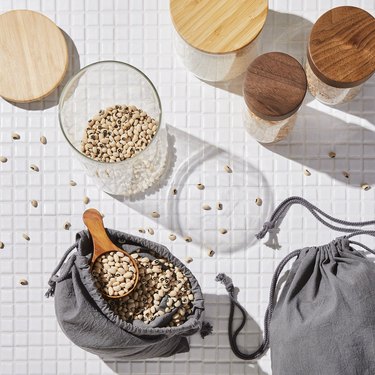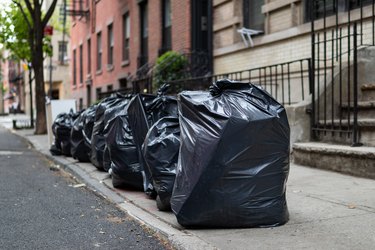
The average person generates nearly 5 pounds of trash every day, according to Environmental Protection Agency figures from 2018. Because we're all making a lot of it, knowing how to get rid of trash is a basic skill that everyone needs to have, and federal and municipal regulations about waste disposal are constantly changing. Usually, those rules are made with the goal of controlling pollution and increasing sustainability efforts. There's also a lot of variation in how municipalities handle waste management, so neighboring towns might have very different waste disposal rules.
The good news is that there are a lot of options for how to get rid of trash in ways that cause minimal environmental harm. Organic materials can be composted and turned into soil additives. There are countless ways to reuse household items and online tutorials to walk you through all of them. A lot of your "trash" can actually be recycled, though not all of it can go in your recycling bin. Mail-in and drop-off programs accept some of those hard-to-recycle items. And some of your junk will ultimately end up in landfills.
Video of the Day
Video of the Day
It can get confusing to navigate all those different avenues for getting rid of trash. Once you're familiar with your general waste management options, it gets a lot easier and quicker to deal with the junk you generate every day. Here's an overview of everything you need to know about how to get rid of trash the right way.
Recycle What You Can
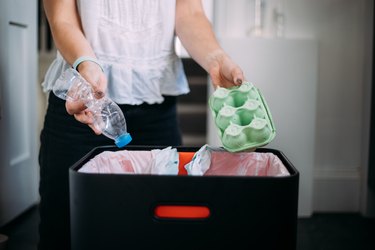
In the most basic terms, recycling is the process of breaking down old materials so they can be reused to make new materials. Disposing of recyclable materials in this way keeps those materials out of landfills, slowing down the rate at which they reach capacity. Landfills generate harmful methane emissions and can contribute to air and water pollution, so minimizing how much stuff we dump there is a good thing.
Creating materials from recycled content also tends to use less energy and fewer natural resources than using virgin or raw materials. For example, making new plastic generally requires using fossil fuels, including crude oil and natural gas. Extracting those materials from the earth causes environmental damage, and the refining and manufacturing processes generate dangerous pollution. Making new plastic from existing plastic minimizes the need to extract and refine fossil fuels.
What Can Be Recycled?
- Paper and paperboard products (like cardboard) are by far the most commonly recycled materials in the U.S. With the exception of things like shiny wrapping paper, most kinds of paper and paperboard can be recycled.
- Plastic can be recycled, but only certain types are accepted by most municipalities for curbside recycling. Plastic is categorized by number, with a total of seven types. Typically, types 1 (PET) and 2 (HDPE) plastics can be recycled this way. Other kinds of plastics, including Styrofoam, may be accepted as drop-offs by recycling services in some areas. (Fun fact: Scientists have actually figured out a way to make something edible from recycled plastic bottles!)
- Glass typically is highly recyclable because it can be melted down and reformed over and over again. But because it's so breakable, some recycling programs don't want glass mixed in with other recyclables. How glass recycling is handled varies greatly from place to place.
- Metal is also highly recyclable. Aluminum, steel, and tin can generally go in recycling bins; large amounts of metal can be sold to scrap yards.
- Electronics are composed of multiple components, many of them recyclable. Obsolete or broken electronics (also called e-waste) should be wiped of any memory when relevant. Then, e-waste can be recycled through a mail-in or drop-off program run by an electronics retailer. It may also be dropped off at an electronics recycling facility.
Safe for the Recycling Bin
- Junk mail and other nonprivate papers
- Flattened cardboard boxes
- Empty aluminum, steel, and tin cans
- Clean aluminum foil
- Clean glass bottles and jars (depending on local rules)
Keep Out of the Recycling Bin
- Plastic bags of any type
- Plastic wrap
- Styrofoam-type packaging
- Food boxes with a waxy or plastic coating, such as milk cartons and frozen food boxes
- Batteries
- Shredded paper
- Sharp metal
How to Find Recycling Services
Most municipalities provide curbside recycling services and have their own guidelines around what kinds of materials can be collected through curbside recycling. It's important to check your municipality's specific guidelines, which are typically available online. Do an online search for your city or municipality name plus "recycling services" for more information.
Certain common household items can be recycled but require special handling, so they're only collected by certain programs and not in curbside bins. For example:
- Grocery stores and big-box stores often collect clean plastic bags for recycling and may also collect household batteries for disposal.
- Auto supply stores may take old car batteries.
- Hardware stores often accept certain kinds of light bulbs for recycling.
- Used printer cartridges may be recycled in stores that sell printers or by using mail-in services.
In addition to your municipality's recycling services website, Earth911 is a useful resource for finding recycling information for specific items.
Tip
Did you know mattresses can be recycled? That's good news because they take up lots of room in landfills, and they're difficult to donate. (Thrift stores generally won't accept used mattresses, though mattresses in good condition may be passed on to someone else through a platform like Facebook Marketplace or Freecycle.)
Mattress disposal laws and options vary from place to place, but several states have implemented laws that make it easy for residents to drop off used mattresses at disposal sites for recycling.
Avoid Wishcycling
It's important to remember that there's a difference between "can theoretically be recycled" and "will actually be recycled." Many common items, like plastic bags and Styrofoam containers, can technically be processed and recycled into new materials, but it's too expensive and/or difficult for every recycling facility to manage these materials. Other materials may be recyclable but are too contaminated to actually be recycled — think cardboard pizza boxes that are soaked with oil.
Tossing these "unrecyclable" materials into your recycling bin because you hope or assume they'll be made into new materials is called wishcycling. It causes sorting issues for recycling centers. If you're unsure whether something belongs in the recycling bin (and your municipality's guidelines haven't helped), err on the side of caution and treat it as trash instead.
Compost Organic Matter
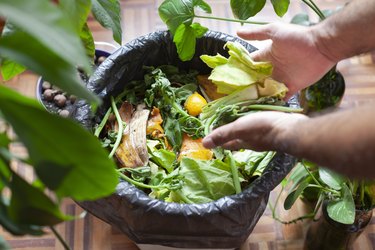
Composting is an environmentally responsible (and useful!) way to manage any organic waste that your household generates. This disposal method involves letting organic matter break down gradually into a nutrient-rich material called compost, which can then be used to enrich soil for growing plants. Not only does the process generate useful compost but letting organic waste break down this way keeps it out of landfills.
The long list of things that can be composted includes these items and more:
- Food waste (like uneaten food and vegetable/fruit scraps)
- Crushed eggshells
- Grass clippings and other yard waste
- Shredded, nonglossy paper
- Shredded cardboard
- Coffee grounds
- Paper coffee filters
- Paper tea bags without staples
- Wood ash
How to Compost
If you don't already compost, there are a few ways you can get started.
- Create your own backyard compost bin. It's easier than you might think to become a home composter, and it's a win-win if you have any plants in your yard or home that could benefit from compost. Getting started doesn't require much more equipment than a compost bin. You can build your own bin and occasionally turn the pile with a pitchfork to aerate it or buy a tumbling compost bin for even easier maintenance.
- Many municipalities operate drop-off compost sites where residents can bring their yard waste and other organic waste to be composted, while gardener
- can buy finished compost on-site. If you have a friend or neighbor who composts, they might also welcome your organic waste. Collect your kitchen scraps in a stylish countertop compost bin between drop-offs. Get a compact lidded bin to hang from a wall or under the sink if you have limited counter space.
- Consider investing in a countertop composter that does all the work for you. If you don't have space for an outdoor bin but have houseplants that would benefit from compost, this could be a perfect solution.
Try Composting With a Worm Bin
If you're not squeamish, vermicomposting might be for you. It's a type of composting process that uses worms to break down organic waste. The conditions have to be right for the worms to stay alive, so it's not ideal in places that get extreme temperatures ... unless you're comfortable with an indoor worm bin.
Donate Gently Used Items
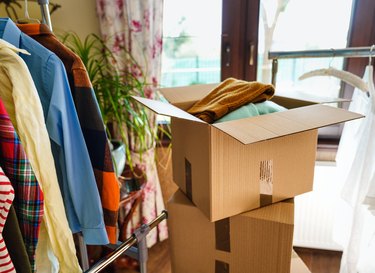
Between Goodwill, other thrift stores, Habitat for Humanity, and local charitable organizations, there are a lot of places in most communities that welcome donated items. Just make sure everything is clean and functional before donating.
Note that different organizations have different guidelines for the kinds of things they'll accept. For example, Goodwill may not take furniture or building materials (each branch has its own donation policies), but Habitat for Humanity's ReStores will generally take these donations. Check with your local branches for specific guidance. Nonprofits that help homeless families move into housing might want furniture and small appliances. Some organizations will pick up large amounts of donated items or bulky items from your home.
Donate These Household Items
- Appliances that still work
- Pots, pans, and other kitchenware in good condition
- Clothing, outerwear, and shoes in good condition
- Sheets, towels, and other linens
- Books and games
- Unused or gently used building materials
- Working tools
- Working electronics
Don't Donate These Items
- Mattresses and/or box springs (may be donated directly to someone in need but generally not to Goodwill or other thrift stores)
- Sofas or other upholstered furniture items that are stained or have odors
- Appliances or electronics that are broken or too outdated to be useful
- Weapons
Manage Household Hazardous Waste Carefully
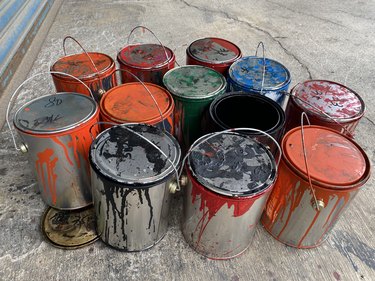
Paint, flammable liquids, pesticides, gasoline, and certain cleaning products are just some of the common household items that are considered hazardous waste. These materials should never be put in trash cans or recycling bins.
Municipalities may operate drop-off locations where residents can bring household hazardous waste throughout the year, or you may need to hold on to your hazardous waste until a big collection event is held.
Throw Away Trash
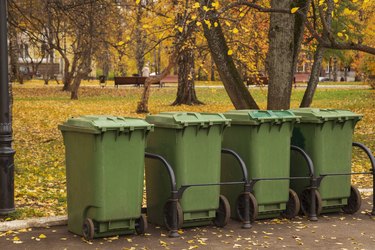
If something's not reusable, recyclable, or compostable or if it's potentially hazardous or not suitable for donation, it's probably safe to treat it as garbage. Put it in your trash can.
Getting rid of old furniture; mattresses; and bulky items, like refrigerators and stoves, might cost you a little money. Trash pickup workers will generally ignore these items if you leave them by the curb. Likewise, construction debris won't be collected with your other trash.
You may be able to drop these off at a landfill yourself if you have access to a truck. (Mattresses and box springs are an exception in states that have designated drop-off sites for convenient mattress recycling, and in Massachusetts, it's the law that mattresses have to be recycled rather than landfilled.) Otherwise, hiring a junk removal service to take away your bulky trash might be the best way to get rid of these things quickly. Your trash collector might also collect bulky items by appointment or during a yearly bulk-item pickup.


